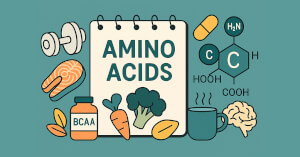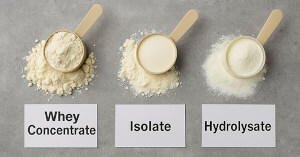
What Supplements Can Help With Leg Muscle Cramps?

Leg muscle cramps can appear suddenly and feel sharp, intense, and difficult to ignore. Many people experience them during exercise, at night, or after long periods of sitting or standing. These cramps often involve the calf muscles, but they can affect the feet, thighs, or even the hamstrings.
While hydration and stretching play a role, certain supplements can also help reduce the frequency and intensity of cramps.
This guide reviews the most effective supplements for leg muscle cramps, how they work, and what dosage ranges are typically used.
What Causes Leg Muscle Cramps?
Several factors can trigger muscle cramps. The most common include low electrolyte levels, dehydration, intense physical activity, nerve fatigue, or simply holding a position for too long. Some people experience night cramps linked to aging muscles or lower circulation in the legs.
Electrolytes, including magnesium, potassium, sodium, and calcium, help carry electrical signals that allow muscles to contract and relax. When levels become unbalanced, muscles can tighten unexpectedly and cause painful spasms.
The Best Supplements for Leg Muscle Cramps
1. Magnesium
Magnesium is one of the most recommended supplements for leg cramps. It helps muscles relax by supporting calcium regulation inside muscle cells. When magnesium is low, the muscles become more sensitive and prone to involuntary contractions.
Some clinical observations suggest that magnesium supplements may help reduce the frequency of nocturnal leg cramps, especially in people who are low in magnesium due to age, stress, or poor dietary intake. Magnesium bisglycinate and citrate are often preferred because they are well tolerated and easily absorbed.
✔️ Typical Dosage Range: 200 to 400 mg per day.
2. Potassium
Potassium plays a central role in muscle contraction and nerve signaling. When potassium levels drop, the balance between sodium and potassium becomes disrupted, which can lead to cramping. This is more common in people who perspire heavily, follow low-carb diets, or do not eat enough fruits and vegetables.
In a clinical study involving adults with low potassium intake, supplementing with moderate amounts improved muscle comfort and reduced cramp frequency over several weeks. If your diet is already rich in potassium, supplementation may not be necessary, but for some individuals it can make a noticeable difference.
✔️ Typical Dosage Range: 90 to 300 mg per day unless otherwise instructed by a clinician.
3. Electrolyte Blends
For people who exercise frequently, sweat heavily, or follow intermittent fasting, electrolyte blends can provide fast relief. These formulas usually include a balanced mix of sodium, potassium, and magnesium. They help replace minerals lost through sweat and support normal muscle function.
Some small trials in athletes show that using electrolyte blends before and during exercise can reduce the likelihood of cramping during intense activity. This makes them a practical choice for runners, cyclists, and anyone who trains in hot weather.
If you prefer a natural option, coconut water can work as a lighter electrolyte source. It contains potassium and a small amount of sodium, which can help with hydration, although it is not as concentrated as a dedicated electrolyte powder.
✔️ Typical Dosage Range: Follow product instructions, often 1 serving per workout or per day.
4. Calcium
Calcium contributes to muscle contraction, and imbalances can trigger cramps. While low calcium is less common than low magnesium, it can still appear in people who eat little dairy, have vitamin D deficiency, or experience age-related changes in calcium absorption.
Some controlled research in older adults has linked balanced calcium intake with improved muscle comfort. Women over 40 who experience leg cramps may benefit from checking both their calcium and vitamin D levels.
✔️ Typical Dosage Range: 500 to 1000 mg per day from diet and supplements combined.
5. Taurine
Taurine is an amino acid that helps regulate calcium flow in muscle tissue. This makes it useful for supporting normal muscle contraction and relaxation. Taurine is also involved in maintaining electrolyte balance inside the cells.
In a small study from 2021, adults who took taurine daily reported improved muscle relaxation and fewer cramps after several weeks. It is often used by athletes who experience repeated muscle tightness during training.
✔️ Typical Dosage Range: 500 to 2000 mg per day.
6. Vitamin D
Low vitamin D levels can increase neuromuscular excitability. This means the nerves that control muscles may fire more easily and create involuntary contractions. People with limited sun exposure or low dietary intake often become deficient without noticing.
Some research suggests that improving vitamin D levels may help reduce leg cramps, especially in adults over 50. The effect is stronger when vitamin D deficiency is confirmed by a blood test.
✔️ Typical Dosage Range: 1000 to 2000 IU per day for maintenance.
7. Vitamin B Complex
B vitamins support nerve function. When nerves do not communicate properly with the muscles, cramping can occur more easily, especially during the night. Vitamin B1 (thiamine), B6, and B12 are particularly important for muscle and nerve coordination.
Some clinical reports show that adults who supplemented with B vitamins experienced fewer night cramps after consistent use. This makes B complex a useful option for people whose cramps may be nerve related rather than electrolyte related.
✔️ Typical Dosage Range: One standard B complex capsule daily.
8. L-Carnitine
L-carnitine helps the body turn fat into usable energy. Fatigue and muscle overload can increase the risk of muscle cramps, especially during long workouts. For individuals with low carnitine levels, supplementation can support better muscle endurance.
Some clinical studies in older adults have shown that L-carnitine may help reduce muscle discomfort after exercise. It is not typically a first-line solution for cramps but can help when fatigue is involved.
✔️ Typical Dosage Range: 500 to 2000 mg per day.
9. Pickle Juice
Pickle juice has gained popularity as a fast-acting solution for cramps. Its acidity and electrolyte content may activate a reflex in the mouth and throat that reduces nerve firing in the muscles. This mechanism does not rely on digestion, which is why some people report relief within minutes.
It is often used by athletes who need quick relief during training or events. Although not a traditional supplement, it is considered functional because it targets muscle cramping through nerve pathways.
✔️ Typical Dosage Range: 30 to 60 ml at the onset of a cramp.
If You Have a Cramp Right Now
If you are currently experiencing a leg cramp, a few options may offer faster relief than traditional supplements. Most capsules take time to absorb, but certain products act through the nerves in the mouth instead of digestion, which can calm the cramp more quickly.
Here are the options that work the fastest:
-
Pickle juice: One of the fastest options. A small amount can trigger a reflex that reduces the nerve activity causing the cramp. Some people notice relief within one to two minutes.
-
Electrolyte powders: These can help if the cramp is linked to dehydration or heavy sweating, although their effect is usually slower than pickle juice, often taking about 10 to 20 minutes.
-
Magnesium (liquid or powder): It may help relax the muscle, but it is not an immediate solution. It usually takes around 30 to 60 minutes to be absorbed and start influencing muscle relaxation.
When to See a Doctor
Most leg cramps are harmless and improve with hydration, stretching, and appropriate supplementation. However, recurring or severe cramps can sometimes signal an underlying condition, such as circulation issues, nerve compression, medication side effects, or mineral imbalances.
If cramps are frequent, extremely painful, or accompanied by swelling or numbness, a medical evaluation is recommended.
Suggested Supplement Approach
You do not need to take all of these supplements at the same time. Start with magnesium, as it is the most commonly effective and generally well tolerated. If you still experience cramps, consider adding electrolytes or taurine. Vitamin D or a B complex can help when deficiency or nerve-related factors are involved.
As always, consistency matters more than taking many supplements at once. Give each option a few weeks to evaluate its effect.
This article was originally published on Stackbb, your trusted source for science-based supplement guides.







